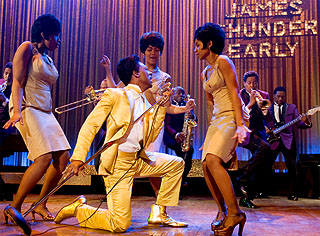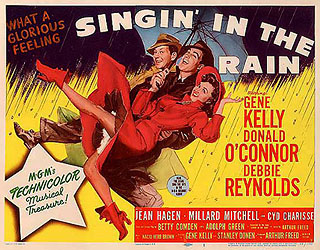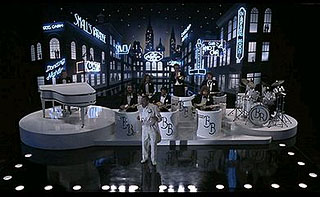
I saw Dreamgirls this weekend — it was great!
I’ve been to my fair share of movies where the audience broke out into enthusiastic and spontaneous applause before, but they’ve almost always applauded some kind of triumphant action scene, never clapping and cheering for an individual performer. Which is to say that they are applauding the film itself, not the humans in it.
That is, until this weekend. Jennifer Hudson got at least three full rounds of applause from my Brooklyn audience, whose boisterous cheering for the performance (and singing along occasionally) almost seemed to suggest that Ms. Hudson was actually up there on stage in front of us to hear our appreciation.
For most of my “young adult” life (that is, my teens and twenties) I despised musicals. I thought they were phony and vapid — why in the world would a pair of New York street gangs suddenly form up into chorus lines and sing in the middle of the alley? Why would a group of sailors on shore leave suddenly burst into song and synchronized tapdancing on restaurant tables? It was silly to me, not worthy of the serious taste I liked to think I had.
And yet countless critical “top ten” lists include Singin’ in the Rain. This always baffled me. How can this be?
Well, over the years I’ve started to notice that I think I actually do like a lot of musicals. I may in fact, have liked a lot of musicals all along — but only certain kinds: I’ve realized that I pretty much only like musicals about musicals, or at least musicals about people who sing and dance and perform.
Singin’ in the Rain

Singin’ in the Rain was the movie that finally clarified this for me. If Singin’ in the Rain is not a movie you already love, if you think it’s just saccharine dreck, please go see it now and give it the benefit of the doubt. Try to think about it not as pablum for the ignorant but instead think of it as a work of art created by real artists.
I saw the movie as a brilliant answer to a very specific, creative challenge, a solution that used the film medium to explore the history and nature of live performance. The creative conceit of the movie was dead simple, but the writers, the legendary Betty Comden and Adolph Green, were more than up to the challenge. Their goal was also, I thought, simply this: Try to fit as many song and dance numbers into a single movie as possible!.
[On a side note, Comden and Green both died within a week of each other just last year. They also wrote Auntie Mame, another one of my favorite comedies. A sad loss.]
The resulting plot is a glorious postmodern knot, with a half-dozen different musical milieus, each of which can support a half-dozen musical numbers: A couple of silent film stars, who used to be Vaudeville performers find themselves forced to retrofit their latest silent movie into a talkie. In order to make it a smash hit, they decide to make it a musical comedy. But because the silent film starlet’s voice is so bad, a new singer is found to overdub her voice and fall in love with Gene Kelly. Hilarity ensues, not to mention what seems like fifty different song and dance numbers. Beleive me, you just have to see it.
When people who are already singers and dancers decide to sing and dance, it doesn’t seem so out of place or unnatural at all. Somehow I find it easier to swallow than, for example, seeing a bunch of dust bowl Okies break out into a Broadway stage show.
What’s more, when a character who is a performing artist starts singing in the middle of a seemingly normal situation (like having a conversation or walking down the street), and then suddenly even more surreal things start happening (like other people in the street start dancing too, or the whole setting and all the costumes suddenly change, or a whole year passes in three minutes), it seems like a natural turn of events, just the kind of thing that happens in the milieu (the physical and emotional worlds) of the performing artist. When we’re in the world of performers, we’re always only a step away from fantasy.
Other movies that have won me over in this way include The Blues Brothers, Hustle & Flow, Moulin Rouge!, and just about any of the countless jaw-droppingly surreal Busby Berkely movies.
Suspension of Disbeleif. Or, Lighten Up!

My favorite example of this phenomenon, one that distills it down to its purest essence, is the scene in The Blues Brothers where a haggard old Cab Calloway stands in front of a sorry-looking ragtag band in a run-down old theater and suddenly, out of nowhere, he and the band are dressed in white tuxedoes in front of an ornate silver, white, and neon bandstand, performing “Minnie the Moocher” as if it were 1938 all over again. Then, when the song ends and we’re drawn back into the physical reality of the film’s setting, the emotional reality of his triumphant performance remains.
The very first image of Moulin Rouge! is a pair of red curtains opening, telling us to suspend our disbeleif, to let down our guards, and to allow ourselves enjoy a show that goes beyond the serious or the literal and into a world of fantastic energy and creativity.
Talent
It also helps that, in almost all of these films, the actual performers were inhumanly talented. From Donald O’Conner (watch this video now!) to James Brown to Jennifer Hudson, the performers naturally make a huge difference. This is why I hated the movie Chicago so much: nobody in the film had any singing or dancing talent whatsoever. Richard Gere’s dancing consisted of a series of close ups of his shoes and hands and teeth, but no actual “wow look at that guy dance” moments ever occurred. If they weren’t going to hire real singers and dancers, couldn’t they at least have hired actors who would take the time to learn to sing and dance? I mean, even Ewan MacGregor and (to a lesser extent) Nicole Kidman in Moulin Rouge! worked their asses off out to sing and dance in a way that matched the fantastic action and choreography around them.
Finally, I just have to add that the movies South Park: Bigger, Longer & Uncut and Team America: World Police were both bona fide musicals and the songwriting in both films was fantastic. If you liked those movies and still, as I do, hate almost every other of America’s favorite musicals, face it: you do like musicals, so there.